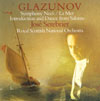Glazunov Symphony No 6; (La) Mer
Powerful performances of a sixth symphony, seven veils and a seascape
View record and artist detailsRecord and Artist Details
Composer or Director: Alexander Konstantinovich Glazunov
Genre:
Orchestral
Label: Warner Classics
Magazine Review Date: 3/2009
Media Format: CD or Download
Media Runtime: 0
Mastering:
Stereo
Catalogue Number: 2564 69627-0

Tracks:
| Composition | Artist Credit |
|---|---|
| Symphony No. 6 |
Alexander Konstantinovich Glazunov, Composer
Alexander Konstantinovich Glazunov, Composer José Serebrier, Conductor Royal Scottish National Orchestra |
| (The) Sea |
Alexander Konstantinovich Glazunov, Composer
Alexander Konstantinovich Glazunov, Composer José Serebrier, Conductor Royal Scottish National Orchestra |
| Salomé, Movement: Introduction |
Alexander Konstantinovich Glazunov, Composer
Alexander Konstantinovich Glazunov, Composer José Serebrier, Conductor Royal Scottish National Orchestra |
| Salomé, Movement: Dance |
Alexander Konstantinovich Glazunov, Composer
Alexander Konstantinovich Glazunov, Composer José Serebrier, Conductor Royal Scottish National Orchestra |
Author: Edward Greenfield
From the formidable list of rival versions of this C minor work, arguably Glazunov’s most powerfully dramatic symphony, dating from 1896, this one from José Serebrier and the Royal Scottish National Orchestra is among the very finest. Warm and approachable with Serebrier drawing beautifully moulded playing from the Scottish orchestra, with rubato perfectly judged and with the orchestra as fine and resonant as I have ever heard it, it is vividly recorded in rich, unexaggerated sound.
Glazunov’s lyrical second subjects were always striking, and the one in the first movement here is no exception. The structure is clearly defined with fine thrust from the performers, and with that theme coming thrillingly back fortissimo at the climax of the movement. The theme and seven variations which make up the second movement go with an easy flow, with the brassy climax of the seventh variation well controlled in its dynamic contrasts. The third movement is a charming allegretto with neo-classical overtones, while the finale is the most powerful movement of all with its Borodin echoes at the start and a most ingenious combination of sonata and double-variation form, all of which Serebrier brings out most persuasively.
The fill-ups, though much less powerful, are well worth hearing, two works that vie with the masterpieces of Debussy and Strauss. La mer of 1889 (antedating Debussy) is a richly evocative seascape with the harp very prominent, hardly equalling Debussy’s masterpiece but very attractive, while the Introduction and Dance from Salomé, more conventional than the rest, were from incidental music that Glazunov wrote for a production of the Oscar Wilde play in 1908. There is a powerful gesture at the start of the Introduction with Salomé’s Dance predictably getting faster and faster and with the horn-writing adding to the exotic orientalism. Altogether a splendid issue, adding significantly to Serebrier’s excellent Glazunov series for Warner.
Discover the world's largest classical music catalogue with Presto Music.

Gramophone Digital Club
- Digital Edition
- Digital Archive
- Reviews Database
- Full website access
From £8.75 / month
Subscribe
Gramophone Full Club
- Print Edition
- Digital Edition
- Digital Archive
- Reviews Database
- Full website access
From £11.00 / month
Subscribe
If you are a library, university or other organisation that would be interested in an institutional subscription to Gramophone please click here for further information.




